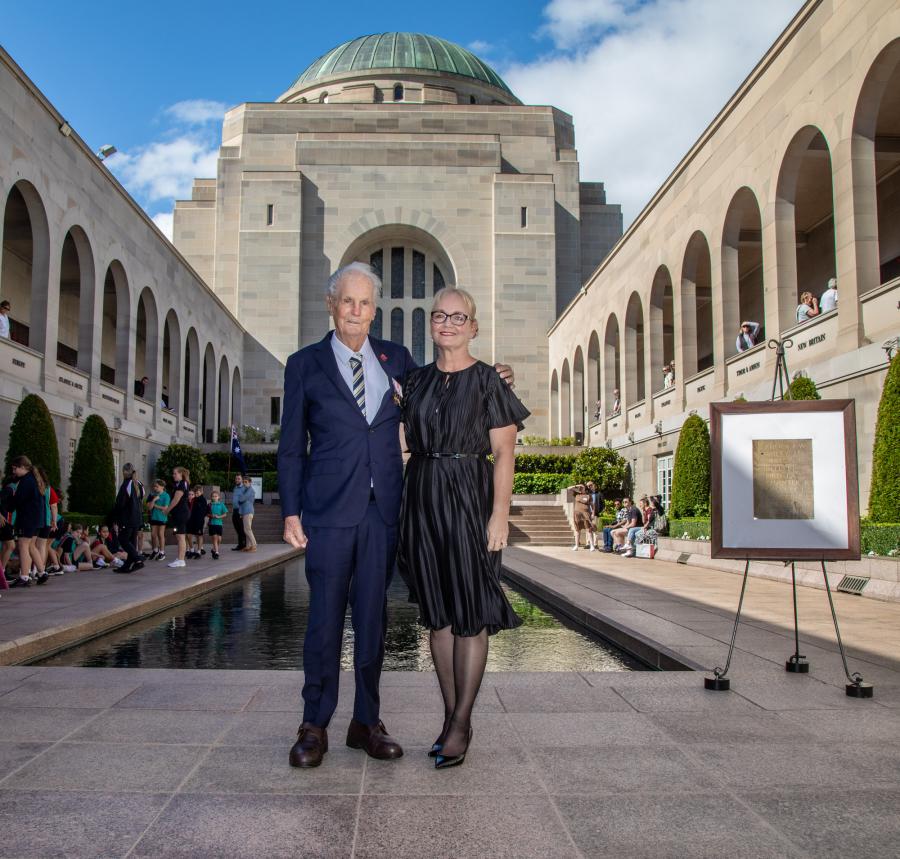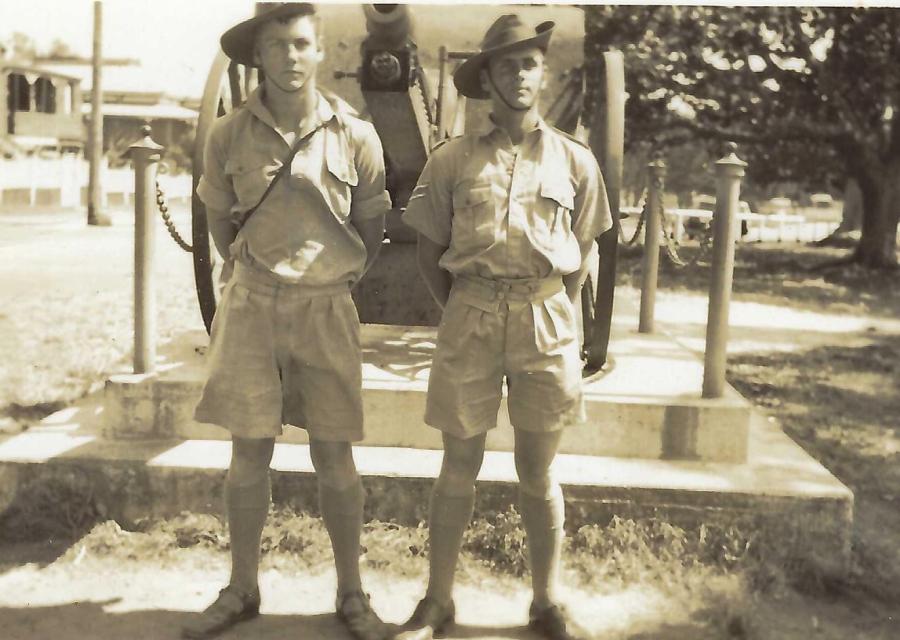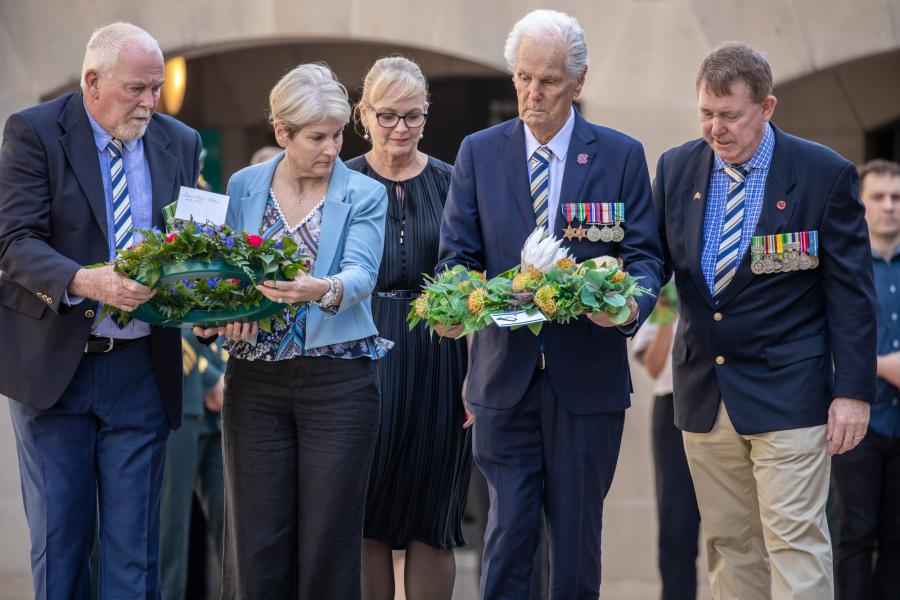'I was lucky to get home'

Second World War veteran Jim Grebert with his granddaughter Helen at the Memorial.
Jim Grebert has had a remarkable life.
But Jim, now 100, almost didn’t make it past his 21st birthday.
He and his mates were fighting from a trench in New Guinea during the Second World War when a mortar shell exploded, almost burying them alive.
“I got a direct hit on all my gear,” he said. “And it’s still somewhere up in the tops of the trees.
“You’d hear this big shell coming over, tumbling, and then it went swoosh, and you knew it was going to come on top of you.
“All I ever found of my gear was a little photo of the girl I used to write to, and even then, the shrapnel tore it in half.
“I lost everything, but I was lucky. I remember another bloke, he was in this hole, and he says, ‘In here, in here.’ So we got in on top of him and we felt quite safe in there.
“We were lucky we never got blown into a million pieces, another fellow and myself. It was just like… you were all up against a wall, and a bull comes and charges and it hits you. That’s how it felt, the explosion. Your ears are ringing and you’re bleeding from the ears. And that’s concussion …
“I suppose I was lucky to survive. It was a big shell … blew everything up…
“But enough of that… It was a long time ago.
“It didn’t blow me up. And I’m still here.”

Jim Grebert with his brother Walter during the Second World War. Photo: Courtesy Jim Grebert
The third of 11 children, James Grebert was born in Atherton, far north Queensland, on 12 February 1923. He was raised on a dairy farm at Millaa Millaa –and he shared his story over a glass of milk.
“I learnt to milk cows when I was five years old,” Jim said. “And once you learnt on a farm in those days, you were hooked. And you had to do it anyway.
“I left home fairly young, 15 or something like that. This fellow who I was working with said, ‘There’s got to be a better life than what we’re living,’ cutting lantana and that.
“It’s stinking hot, so he said, ‘I’m leaving in the morning.’
“And I said, ‘I’m coming with you.’”
They headed south to New South Wales and Jim found work on a banana plantation, earning one and threepence an hour. It wasn’t much – “The men were getting two and six, and I was doing the same work as them” – but he managed to get by.
When war broke out, Jim was determined to enlist.
“I was 16 year old, and my brothers said, ‘We hope the war keeps going – we’ll all be soldiers.’
“Poor old mum – her brother went to World War I, you see – but we had no conception it was a great big deal. And so we lived to be soldiers. And luckily we all survived.
“They had a call-up, and all the blokes I was working with were going. So I told them I was older than I was, and I went with them.
“Why, I don’t know. It was just that all the others were going and we thought it was a big event; not much brains at that age.
“So I joined the AIF at Canungra, which is a jungle training school, and the rest is history.
“In the end, there was four of us [who joined up] and my mother was very proud of us.”
September 1945: Members of 3 Platoon, Headquarters Company, 58/59 Infantry Battalion, at Torokina, Bougainville. Jim is pictured, back row, second from right.
Jim, the second of the four Grebert brothers who served, was working as a sawmill hand when he enlisted in the AIF in July 1943. He had just turned 20, but said he was 21. His eldest brother, Walter, had enlisted in January 1940 and was serving with the 25th Battalion when the Japanese landed at Milne Bay in August 1942. Two of their younger brothers, Ted and Jack, went on to serve with the Royal Australian Air Force later in the war. Their mother Sarah wore her female relatives badge with pride – its four stars representing each of the four boys who served.
Jim would go on to train at Dubbo and East Maitland before returning to Queensland and then serving with the 58/59th Battalion in New Guinea.
“We went through jungle school at Canungra and then got drafted overseas as reinforcements,” Jim said.
“I joined the battalion at Lae and then we did a stint up to the Finesterres … and then later on to Bougainville.
“Lae had been fairly well bombarded ... American planes and that.
“And that’s where I got malaria the first time.
“We used to all have those Atabrine tablets [to help prevent it], and you’d end up all yellow…
“But we were only there a week, and I had malaria and dysentery.
“Dysentery is an awful thing – it just runs out of you like you are bleeding.
“But malaria, geez, it’s painful. You would shiver and shake and get violent headaches.
“I don’t how many times I had bloody malaria, about half a dozen, but sometimes it stays in your system for ages. It’s a rotten thing.”
February 1944: The view from Crater Hill in the Finisterre Ranges looking along the Mindjim River Valley. The troops in the foreground are members of the 58/59th Infantry Battalion.
Jim remembers the conditions were lousy, but they managed to make do.
“The rain!” he said. “Oh, it was miserable. You were wet more times than you were dry. And up in the mountains you would see the clouds floating along below …
“Once in a blue moon you would get a bit of fresh meat or something. Otherwise it was all the tinned stuff.”
He managed to celebrate his 21st birthday with some cake from his brother.
“I used to smoke in those days, and we were up in the middle of nowhere,” he said.
“There was nothing to read – only Log Cabin Tobacco, Tally Ho cigarette papers, that was it, no nothing.
“It was a pretty miserable sort of a day, and I thought what the hell? It was cold and wet and raining.
“And I had never felt so low in my whole life. It had been raining all week. And my brother sent me up a card and a cake and a bottle of whisky.
“And so I got the cake, but I never saw the whisky. Some other beggars knocked that off along the way.”
He remembers finding a scorpion “as big as a crab” in the pocket of his new trousers.
“Somebody said, ‘Could anybody use an extra pair of trousers?’ And so I said I could …
“They were all crumpled up in the wet, and so I put them on, shoved my hand in the pocket, and bloody hell, there was a scorpion in there.
“They were as big as crabs, the scorpions, and it bit me twice before I got my hand out.
“Geez, it hurt … so I got my hand out of there in a hurry.”
February 1944: A member of the 58/59th Infantry Battalion viewing the Faria River Valley from Crater Hill in the Finisterre Ranges. Shaggy Ridge lies to the right and the Ramu Valley flat can be seen in the distance.
He tells how he lost his “new” trousers when a thunderstorm rolled in.
“We were beside a river, and I thought, ‘Oh muddy clothes, I’ll put my pants in, and put a rock on them, and let the river wash them overnight.’
“But the rivers are very strong up there. You stand in them, and you can really feel it.
“Jeepers, the flow is strong, so I got up in the morning, and the rock and all was gone.”
Jim’s new trousers – and the rock – had washed downstream, never to be seen again.
He remembers watching smoke and lava belching out of a volcano while he was on patrol and marvelling at the sight of it all.
“It was quite a sight,” he said. “I remember one night when it exploded and the moon was shining through. Geez, it was something. I actually saw a blue moon – I don’t know what caused it, or if I was losing my eyesight – but it was a real blue moon.”
Bougainville, Solomon Islands, March 1945: Troops of the 58/59th Infantry Battalion carrying full packs, cross the Torokina River. Mount Bagana, an active volcano, lies in the distance. Jim is pictured towards the middle of the photograph, his hat tilted back in his trademark style.
It was one of the lighter moments in what was a grim war.
“As we were coming down it looked beautiful in the valley, but there was grass six foot high,” Jim said. “It was stinking hot and a lot of blokes died there.
“We watched the planes come, and they strafed the hell out of us, but we had to go up and chase what was left of the Japanese there.
“It was pretty high country, and it was bloody cold at night, I tell you.
“We went from there right through to Bogajim on the coast, following the ridges around more or less, just following the Japanese out …
“We were there for weeks.
“I remember one place where they bombed … the tree split and blew a Japanese [soldier] up …
“It was pretty rotten. They said, ‘Clear yourself a spot, we’re all going to bunk down here for the night, you there, you there,’ and so I grabbed this boot, and it had the bloody leg in it.
“It was pretty rough.
“Sometimes you were there for a week or so. You’d take a position and you’d hold it …
“There was plenty of lead flying around. You could hear it, tumbling over and then a rush and they came in.
“But you’d never know when you’d run into them [on] patrols and that.”
Bougainville, Solomon Islands, March 1945: Troops of the 58/59th Infantry Battalion moving with full packs along a flooded road near the Torokina River.
He was on Bougainville when he learned that the war was over.
“Oh, how would anyone feel?” he said. “We thought, ‘You beauty! You beauty!’
“They were dropping leaflets to the Japanese to come out and give themselves up. And I remember an aircraft carrier full of Japanese being sent back. It was like they’d come out of hollow logs.
“I didn’t get back [to Australia] till about a year after.
“I ended up hitchhiking home and jumped on a boat. Another fellow and myself, we planted down in the coal bunkers.
“When it was time to leave, you could feel the boat start to rock, and the next thing there was another 40 came down inside.
“Whenever they were fuelling the fires on the ship, we’d be banking the coal up so that we didn’t go down the chute with it…
“It took a couple of days or so [to get home], but we didn’t stay down there. We came out and lucky the seamen were good. They were on our side, so they let us sleep in their beds during the day and they’d sleep in there at night time.
“We got to Sydney, and we got arrested … absent without leave. They knew we were on this boat, but they didn’t catch us. They couldn’t find us, you see, and I think they were a bit crooked about that at Murray Barracks, so we were put in the jug there for a while.
“They said, ‘I suppose you were one of these blokes who had an imaginary dog tied up to a palm tree, patting it’s head or something,’ and I said, ‘No sir, but if I’d been there much longer, I would have done sillier things than that.’”
Bougainville, Solomon Islands, March 1945: Jeeps of the 58/59th Battalion being towed by a tractor through a flooded area of the Torokina River.
Jim became a carpenter after the war and married the love of his life, Valmai. They had two children, four grandchildren, six great-grandchildren and six great-great grandchildren. He lost his wife to cancer in 1982, and his son Peter to asbestosis in 2012.
He spent the last 10 years of his working life working in patient care in a public hospital, and now lives in Brisbane with his daughter Susan and granddaughter Helen.
He has been a member of the RSL on and off since the end of the war, and travelled to the Australian War Memorial in Canberra recently with his granddaughter and members of his local Sandgate RSL Sub-branch.
For Jim, it was a moving experience. He had visited the Memorial once before, and laid a wreath at a Last Post Ceremony in memory of his mates.
“I had some good mates who were lost,” Jim said, quietly. “One of the last blokes killed in the war was a good friend of mine.
“When I [first] went to the Memorial in Canberra, I found it very upsetting, seeing the names of those I actually saw getting killed.
“I had a ‘belt of a thousand stitches’ and a Japanese sword [that I took home after the war]. I don’t know what happened to it in the end, but I raffled it [for] one of my mates who was killed and sent the money to his mother.”

Jim laying a wreath at the Memorial. He visited the Memorial with his granddaughter Helen and members of his local Sandgate RSL sub-branch.
Jim remains forever grateful to the Papuans and Solomon Islanders who helped the Australians during the war.
“Without them, we would be sunk,” Jim said. “I remember one time I was in hospital, in what they called a field hospital, with malaria and what not, and I was going back to join the unit. They were up on the top of the mountain and the hospital was way down in the valley …
“I’m sitting there with my pack and my rifle, and the next thing I get a tap on the shoulder. He says, ‘Master, you sick too much,’ and then he turned around, picked up my gear, and went back up.
“He’d already been to the top of the mountain with a load, and then he went back up and left it up there where he knew I’d find it. I mean, how can you forget those things?
“In the mountains, you were up among the clouds, and when I went back to New Guinea [after the war] and I was looking out of the plane, I thought, ‘No wonder it broke my heart...’
“Like all wars, I don’t think they solve a thing really; it’s a waste of young lives.”
Now at 100, Jim credits his longevity to “hard work and plain food”.
He says the secret to living a long life is simple.
“Just keep breathing; that’s the only secret. And enjoy the odd beer…
“I’m 100-plus now.
“And I’m still here.
“I’m here in one piece. And I’m glad for that.
“I was lucky to get home.”





